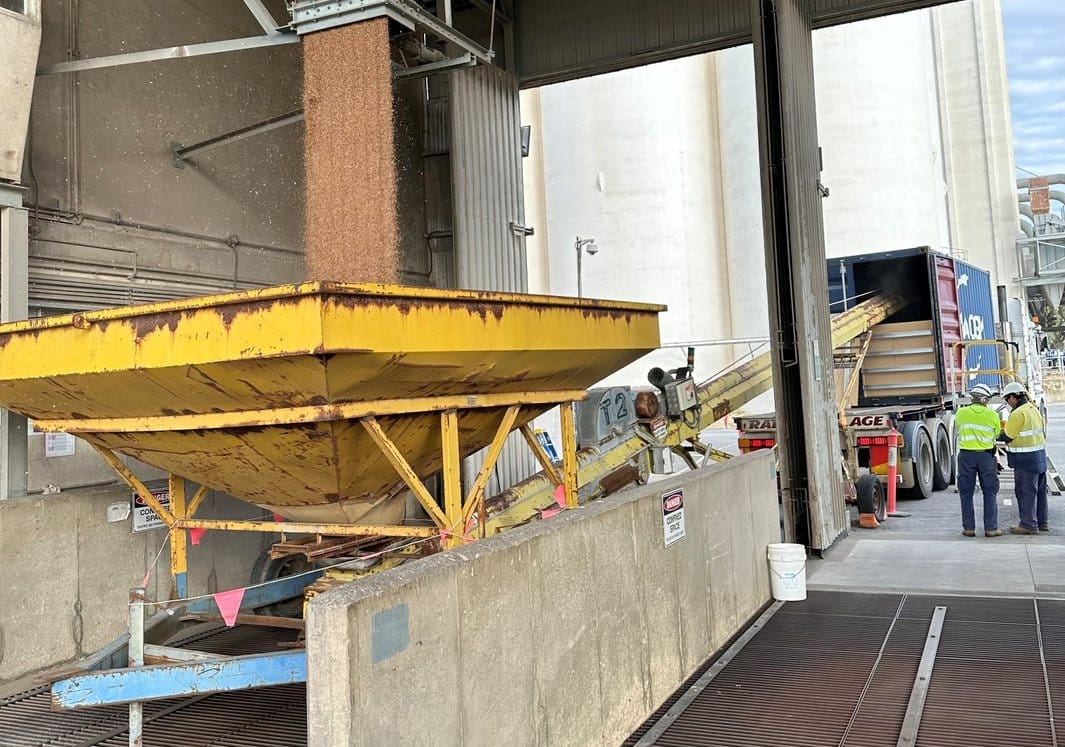
Containers are packed with grain, oilseeds and pulses at many sites across Australia, including Ardrossan on South Australia’s Yorke Peninsula. Photo: Viterra
FIGURES released by the Department of Agriculture, Fisheries and Forestry reveal the grain industry will contribute $12.25 million under the proposed Biosecurity Protection Levy, the most for any commodity impacted by the legislation.
This figure is out of the total revenue of $51.8M that DAFF estimates will be raised by the BPL if it comes into force on July 1.
Included in the grain sector are all cereals, including wheat, barley, sorghum and oats; oilseeds, such as canola and soybeans; and pulses.
Other broadacre crops, such as cotton will contribute $1.18M while rice will raise $97,900.
The second-largest amount will come from the beef industry, which is expected to contribute $9.32M to the BPL revenue total.
The figures were calculated based on the revised design for the BPL, announced in February, which based rates on each industry’s proportionate share of the total gross value of production for the total agriculture, fisheries and forestry sector.
The rate is determined from an averaging of GVP over three years: 2019-20, 2020-2021 and 2021-22.
Under this methodology, the grains sector had an averaged GVP proportion of 23.6 per cent.
Interestingly, the grains sector’s contribution could have been higher if the system did not incorporate GVP for 2019-2020.
Grains’ 2019-2020 GVP was just over $11M, over half 2021-22, dropping the proportion of the total GVP to 15.8pc.
Currently, there is no indication how the BPL will be calculated each year and if the rolling three-year-average models will continue.
Previous model
As highlighted in Grain Producers Australia’s submission to the Rural and Regional Affairs Transport and Legislation Committee inquiry into the BPL, these new figures are small compared to the totals proposed under the previous model.
Announced as part of the Federal Government Budget in May 2023, the initial model calculated the BPL based upon 10pc of existing agricultural levies paid by each industry.
According to GPA, this model would raise $28.56M “based on the conservative estimated value for the previous year’s grain crop at $28B”.
This figure would represent as small proportion of the total $314.16M collected in levies from grain producers, but would be “ten times more” than the Plant Health Australia rate.
Existing levies
GPA argues the grains industry already contributes via levies towards Australia’s biosecurity.
“Grains represents the largest contributors to agricultural levies currently, with record production from in recent harvests,” GPA submission said.
GRDC’s annual report shows grain producers contributed more than $261 million in levies in 2023 and more than $223 million in 2022.
Thanks to funding from these levies, GRDC has reportedly invested $42.3M in biosecurity projects for 2022-23, with a total of about $220M spent over the past six years.
In addition, grain producers also pay the Biosecurity Activity Levy which funds the Grains Farm Biosecurity Program and Plant Health Australia membership, totaling about $1.4M annually.
They also contribute to the cost of fighting emergency threats via the Biosecurity Emergency Response Levy.
This fund has intentionally accumulated over a number of years in order to pay for future emergency responses, and, as of 30 June 2023, has an estimated balance of $7M.
The RRAT inquiry into the Agriculture (Biosecurity Protection) Levies Bill 2024 [Provisions] and related bills will hold a public hearing tomorrow.
On 21 March 2024, the Senate referred the Agriculture (Biosecurity Protection) Levies Bill 2024 [Provisions], the Agriculture (Biosecurity Protection) Charges Bill 2024 [Provisions] and the Agriculture (Biosecurity Protection) Levies and Charges Collection Bill 2024 [Provisions] to the RRAT Legislation Committee for inquiry and report by 10 May 2024.
Grain Central: Get our free news straight to your inbox – Click here

HAVE YOUR SAY